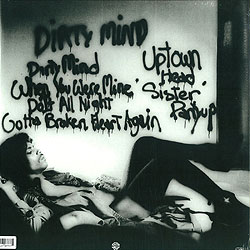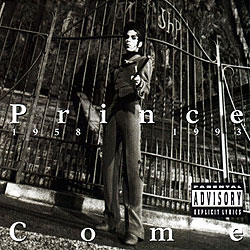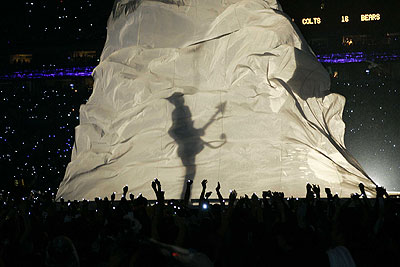Prince’s Dirty Mind
Published on January 30th, 2012 in: Issues, Music, Oh No You Didn't, Teh Sex |By Paul Casey
Those who are only familiar with Prince as a traveling hits tour; one who thinks that Biblical coincidence—hello! 3121 perfume—is a guarantee of good business; and who makes deranged cultish put-downs of homosexuality and his old friends may not be aware that he was once something else. Some omni-sexual thing that was an expert in transgressive pop music and performance. Some deviant, perverted thing that ejaculated guitar semen onto his audience. Some ballsy twentysomething who wore black underwear and a trench coat to a Stones concert. Some kind of genius.

Photo © Blonde Peterson
From 1978’s “Soft and Wet,” the only sign of Prince’s genius on his debut For You, sex was the thing. Indeed, even now a decade following the misunderstood Jehovah’s Witness tribute The Rainbow Children, sex is still the thing. While most casual fans of Prince are aware of the mention of used Trojan condoms in “Little Red Corvette”—a song and line which is still performed today—or what “Cream” refers to (also still performed), there is a depth of perversion in his music which passes many by.
Prince’s sexual creativity touches areas which make even his longtime fans uncomfortable, including rape, incest, and turning lesbians straight. It has also turned out some of his greatest songs. This is an introduction to and celebration of that work.
Some of Prince’s best filthy songs of his career are contained on the popular and near flawless double album 1999. When this album hit, shit got real serious, real quick. “Let’s Pretend We’re Married” tops the list with the (un) shocking admission, “I sincerely want to fuck the taste out of your mouth.” “Lady Cab Driver” also mixes social commentary with fucking, in that Princely way.
The masterpiece Purple Rain is of course home to the song which started the “Parental Guidance” warnings for dull people, “Darling Nikki.” Apart from the opening lines—”I knew a girl named Nikki, I guess you could say she was a sex fiend. I met in her a hotel lobby, masturbating with a magazine”—the song is lyrically tame compared to many of the other songs that will be mentioned here. It remains a fiercely sexual song due to the power of the performance.
“There’s something about you baby,
It happens all the time
Whenever I’m around you baby
I get a Dirty Mind.”
For transgressive pop/rock/funk, there is no better album than Dirty Mind, released in 1980, an album of such immediate and compelling character that it is still prone to surprise those who think they understand Prince Nelson. Two of his greatest transgressive songs are featured: the concert staple “Head” and the incestuous “Sister.” Both in their way define the quality of Dirty Mind: twisted, provocative songs that revel in lodging obviously wrong behavior in the mind by way of superb song craft.
“Head” has a synth line which hooks you in before deflowering of virginal brides becomes an issue. “Sister,” in its brief new wave rockabilly form, takes the opposite approach by speeding through the story before the listener realizes what has happened, ending in the punchline “Incest is everything it’s said to be.” Prince performed “Sister” well into the ’80s, featuring it on his Lovesexy tour; “Head” stayed around even longer, and has been pulled out in recent years in instrumental form.

Although “Soft and Wet” had been a highlight of an otherwise mediocre debut, it was not until 1979’s Prince that the signature combination of rock and extreme filth was established. The hard rocking, sexual violence of “Bambi” would show Prince’s aggression towards homosexuals (and women), long before obnoxious chatter took place between he and Larry Graham. “Bambi” is about a woman who cheats on Prince with another woman. The song catalogues the ways in which a penis is superior to a vagina, ending with the line “Bambi, I know what you need. Bambi, maybe you need to bleed.”
“That skinny motherfucker with the high voice”
This side of The Artist is certainly the least worthy of celebration, even while the songs mentioned here are exquisite examples of Prince’s deft touch for hooks, beats and effortless cross breeding of genres. The unreleased, original version of “Extra Loveable” culminates with “I don’t think you heard me, I’m on the verge of rape. I’m sorry but I’m just going to have to rape you,” which partially explains why it never saw release. It was, however, re-recorded and released late last year, with the offending line, naturally excised. Not a bad version either.
This sadomasochism was also a feature of “Jerk Out,” written for The Time, but initially rejected due to black male on white female violence. Morris Day, rightly worried about how such a song might be received, refused to record it. Protégés Mazarati recorded the original version, which feature Prince’s familiar falsetto on backing vocals. The Time would eventually record the song in a different form for their 1990 comeback album Pandemonium, scoring a # 1 hit, the first of their career.

Where as “Bambi” and “Extra Loveable” seem dangerously close to the real man, in “Jerk Out” Prince was crafting a divergent personality through the medium of Morris Day. “Chili Sauce” from The Time’s 1984 album Ice Cream Castles shows Morris Day as a character quite apart from the androgynous Prince: a violent, unhinged goofball with a flair for comedy. It was this side of the protégé projects which most appealed to Prince: the ability to be a different person.
Much of Prince’s work with other artists has been with women. Whether it was the superhit “Manic Monday” given to The Bangles or his work with Mavis Staples, Prince has always had a gift for speaking with a different voice. There are two contenders here for sexually fixated classics. The first is Jill Jones’ version of “G-Spot” on her Prince-produced debut. Jill Jones gives the song an airy, poppy quality that it lacks on the unreleased Prince original.
The second is the unreleased Vanity 6 track “Vibrator.” This is a wonderfully silly, dirty song which features Prince playing a woman—something he relished, and also did on the Vanity 6 album track “If a Girl Answers Don’t Hang Up”—who helps Vanity acquire batteries. It is a perfect example of Prince’s sense of humor, as well as his gift for transforming the most sexual topic into pop gold. (The climaxing Vanity was later featured on the Come track “Orgasm” from 1994.) As well as working with a string of women during the ’80s and ’90s, Prince was making protégé albums with himself.
“If we cannot make babies,
Maybe we can make some time.
Fuck so pretty, you and me
Erotic City come alive.
We can fuck until the dawn
Making love til cherry’s gone.
Erotic City can’t you see?
Fuck so pretty, you and me.”
The “Camille” persona Prince created was more important than an album project or a lead vocal credit. It was about complete liberation: from gender, from sexual identity, and from fame. Camille’s pitch altered fervor is first noticeable on “Erotic City,” one of the greatest, filthiest songs in Prince’s career. Duetting with Sheila E., high and low Camille—being both male and female, and something in between—weaves a kind of magic that makes any topic and content acceptable in a way in which “Bambi” or “Extra Loveable” cannot. Just as Prince was dissatisfied with being identified as “black music,” one gender became too restrictive for his music.
The best Camille songs are mostly contained on the unreleased 1986 album of the same name, which was folded into Crystal Ball, and then Sign ‘O’ The Times. All but one of the songs has seen release in its original form, and can be easily compiled, should that kind of thing interest you. “Feel U Up” gets my recommendation as the best dirty track on Camille, and of all of the pitch shifty songs. Camille just wants to feel u up! Nothin’ serious. Go for the extended jam if you can. Ends with unexpected heart:
“In times of trouble
I’ll be right there on the double
Whatever you want
Whatever you need
Ooh baby you can count on me!
Cause I’m a funky man
I’m a funky man.”

1988’s Lovesexy was ostensibly a turn from the dark mood of The Black Album and an embrace of the spiritual element of his music. (It would later be echoed in part with 2001’s The Rainbow Children in how it melded sexuality and spirituality in an amusing, surprising package.) The title track is in many ways the most overt case of Prince addressing the malleability of gender, his voice interchanging with his dancer Cat, as well as Camille. Some of his best covert filth lines are contained on “Glam Slam”:
“Heavy feather flicka nipple
Baby scram water ripple
I don’t understand
It means I love U
Come a butterfly straight on your skin
U go 4 me and I come again
Glam Slam, thank U ma’am
Sun is risen, moon is gone
Soda fizzin’ on the lawn.”
The ’90s were in many ways defined by excess. Excessive recording, excessive output. They were also the time in which Prince turned away from the kind of extreme sexuality that had been a staple of some of his best work. The brilliant rock/rap rhythm of “Gett Off” helped push 1991’s Diamonds and Pearls to commercial success. The extended eight minute-plus version is even better than the single mix. Perversion blow out time. How can a guy hook you as if in a single for eight minutes? By making you jaw with him. “24 positions in a one night stand. Gett Off. Only call you after if you say I can. Gett Off. Let a woman be a woman and a man be a man. Gett Off. If you want to baby here I am.”
Along with the cowbell-laden hit “Cream”—written while he was looking in the mirror—the b-side “Horny Pony” is a classic ’90s Prince sex song. “It’s a new dance, it’s a sex dance.” Wider sound, Rosie Gaines on backing. While 1996’s Emancipation had “Sex in the Summer” and “Joint 2 Joint,” Come, released in 1994, is really the high watermark for the Dirty Mind of Prince. Nothing after Come could compare to the debauchery, violence, and darkness of that album. Which I suppose is appropriate given its title. It was a decade-long foreplay leading up to the inevitable climax. And boy, what a climax . . .
We start with a ten-minute long opener, which is about as filthy a song as Prince has ever recorded, an unusually tactile experience, replete with lip smacking, funky horns, and a hell of a demented lyric:
“Like a splendid, open ended
Celibate friend pretending not 2 know it
When I blow it in your eyes.
Like a strawberry chocolate
Fender jazz, mashed potato, fuzztone
All over your thighs.”
and
“It’s no wonder there’s a puddle there
Holding it in 4 so long
U know U can let it go
It won’t be wrong
It’s just U and me baby
Tonight and 4ever more
U should do that baby
Fuck it
On the floor
Or better yet, why don’t U do it on the chair?
U should get that shit started
U can change your underwear
Yeah, U can always change your underwear.”
Following the release of Emancipation, Prince’s triple album celebrating his release from Warner Bros., several things changed. First his baby with his then-wife Mayte Garcia died. Their marriage, obviously shaken by such a terrible experience, was put under great strain and eventually collapsed. During this time Sly and the Family Stone bassist Larry Graham decided to move into Paisley Park to engage Prince in Biblical debate, eventually resulting in his conversion to the Jehovah’s Witnesses. While not immediately apparent—”Motherfucker” is uttered on the 1998 album The Truth—this led to the excising of all swear words from songs present, past, and future and an attempt to sanitize Prince’s catalogue.
While it is certainly galling that we may not hear “Sexy Motherfucker” or “Darling Nikki” again, it is a mistake to think that his songs are any cleaner in their focus. On his most loathed and misunderstood work, The Rainbow Children, Prince is following the same line of mixing spirituality with sexuality from Lovesexy, the title track itself a direct call back to “Sexuality” from Controversy. On “Mellow” we hear Prince in much the same mood as he is on “Orgasm”:
“Can I sing 2 u while u bring urself 2 joy?
I’ll go slow at first, while u quench ur thirst
Wet circles round the toy, while u bring urself 2 joy.”
He still wants to get you off, even if it’s while he is convincing you to accept Jehovah as your personal savior. Other unusual and forthright examples of fuck talk include, “Sex Me, Sex Me Not” from 2004’s The Chocolate Invasion, “Lolita” from 3121, and the sickest song in a decade “Sticky Like Glue” from the fantastic 20Ten. So do not despair, Prince filth fans! There is much out there, disguised behind a pious visage to quench your thirst for filth.
Suggested listening order:
1. Dirty Mind – Dirty Mind
2. Feel U Up (Extended Mix) – Camille
3. Sexy Motherfucker – Prince and the New Power Generation
4. Sister – Dirty Mind
5. Shhh . . . – The Gold Experience
6. I Love U In Me – The Hits/The B-Sides
7. Electric Intercourse – Purple Rain Sessions (Unreleased)
8. Glam Slam – Lovesexy
9. Cream – Diamonds and Pearls
10. Sticky Like Glue – 20Ten
11. Lolita – 3121
12. 18 & Over – Crystal Ball (1998)
13. Joint 2 Joint – Emancipation
14. Head – Dirty Mind
15. Bambi – Prince
16. Darling Nikki – Purple Rain
17. Let’s Pretend We’re Married – 1999
18. Sex “the ’80s are over and the time has come 4 monogamy and trust” – The Scandalous Sex Suite
—
1. Come – Come
2. G-Spot – Jill Jones
3. Rockhard in a Funkyplace – Camille/The Black Album
4. Jerk Out – Unreleased
5. Soft and Wet – For You
6. Tick, Tick, Bang (Demo) – Unreleased
7. Wonderful Ass – Unreleased
8. Extra Loveable – Unreleased
9. Erotic City (Extended Mix) – The Hits/The B-Sides
10. Sex in the Summer – Emancipation
11. Horny Pony – b-Side to “Cream”
12. Mad Sex – New Power Soul
13. Sex Me, Sex Me Not – The Chocolate Invasion
14. Scarlet Pussy – The Hits/The B-Sides
15. The Stick – The Time
16. Vibrator – Vanity 6 Sessions (Unreleased)
17. Gett Off (Extended Mix) – Diamonds and Pearls
Time limit is exhausted. Please reload the CAPTCHA.